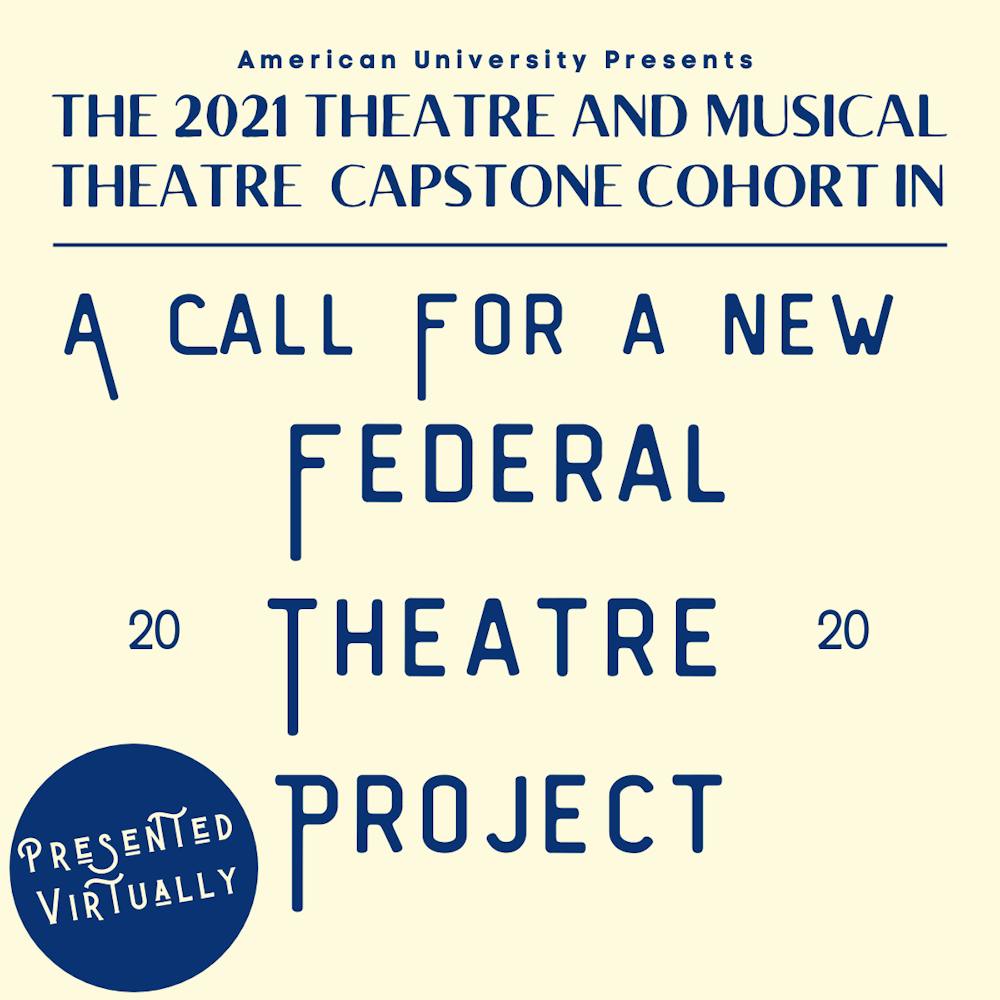“When it is all over, is it even going to be the same?”
American University musical theatre and public relations senior Molly Moore’s character, Laura, asks this question over FaceTime to her sibling Julia, played by theater performance and communication studies senior Sultana Qureshi. Her question about the arts and Broadway in a post-coronavirus world appeared during a piece titled “Perpetual,” directed by senior Deanna Reimertz in the larger production of the theatre and musical theatre capstone, “A Call for a New Federal Theatre Project.”
With an ongoing global pandemic closing Broadway until at least May 2021 and putting the arts industry into further economic peril, 16 American University theatre and musical theatre seniors took to a virtual stage to complete their degree.
Their capstone examined the uncanny resemblance between the arts in the present day and the four-year existence of the Federal Theatre Project; a socially-conscious, federally-subsidized theater program under Franklin Delano Roosevelt’s New Deal. The 2021 theater cohort virtually performed the capstone Jan. 22-23 over Zoom.
The students’ performances were divided into nine parts of varying lengths and topics. Audiences were greeted with more light-hearted scenes, like the students’ TikTok-inspired dancing during the piece titled “all in the right time: ‘The Freedom of the Press’” or the satirical replication of comedians Karen Kilgariff and Georgia Hardstark’s “My Favorite Murder” podcast during the “A Flair for Murder / The Dinner Party Murder” piece.
These scenes were juxtaposed with the more serious pieces on the Federal Theatre Project’s background, students’ experiences with the coronavirus, racial and economic injustices, and censorship of both the news media and the arts.
The COVID-19 pandemic’s effect on AU students was portrayed in a raw way during the portion titled “A Living Newspaper Project: ‘when a crisis hits home,’” inspired by Living Newspapers, like One Third of a Nation, a product of the Seattle branch of the Federal Theatre Project. The cast explained in a Q&A segment after Saturday night’s show that this part of their research came from direct interviews with AU students.
In a video-diary style, the performers told stories of students without incomes having to thrust themselves into full-time jobs to pay rent, all while continuing to be students. They also told stories of students navigating COVID-19 with careless housemates, who disregard the pandemic’s seriousness at the expense of those with health concerns. The Living Newspaper featured stories of students living with seven roommates and not having places to privately take Zoom classes. The stories capped off with a poignant testament from a student that the “American Dream” is dead.
The third to last piece, titled “The Magic Wonk Bus,” was directed by senior musical theatre major, Layla Nabavi, and NYC-based international artist, Shino Frances. The title riffs off Scholastic's “The Magic School Bus,” and follows as Ms. Frazzle, played by musical theatre major, Nikki Scamuffo, takes her class back in time. Their field trip destination follows Hallie Flanagan, the head director of the Federal Theatre Project, played by musical theatre major Emily Brolin, on trial against The House of Un-American Activities for creating shows that promote Communist propaganda.
Once Ms. Frazzle and her class return to the present day, she asks what they’ve learned. While some mention that the committee members were silencing her and upholding toxic masculinity, others mention the committee members being offended by class consciousness. Throughout all of this, the concluding sentiment is this: There is no original work anymore.
According to the performers in the scene, theater during the Federal Theatre Project era challenged the status quo, but today, most shows are singing and dancing advertisements, upholding a capitalistic society. The performers insist, however, that art is not dead as long as artists continue to refuse to conform.
In the Q&A portion after the show, Scamuffo explained her dramaturgical research and how she focused on how we could have a Federal Theater Project today.
She explained how federal funding is spent differently today, citing how, since the 1930s, our military budget has grown and the art budget has shrunk. Remaining optimistic, she noted that her research did show her that there are people fighting for a similar project to exist today, and, in her opinion, with more left-wing leadership, we can “hopefully get to a better place as a country.”
The students put together a capstone website page that shows their research and the playbill.





